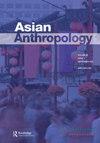“The young, the stupid, and the outsiders”: urban migrants as heterotopic selves in post-growth Japan
Q2 Social Sciences
引用次数: 3
Abstract
Abstract This article explores heterotopic selves by examining the practices and trajectories of urbanites in their thirties and forties who have relocated to rural areas, some of them as rural revitalization volunteers (chiiki okoshi kyōryokutai). Funded by the Ministry of Internal Affairs and Communications, this program started in 2009 and has been highly popular with urbanites. Participants have a one- to three-year period to engage in activities in cooperation with the local government that promote rural revitalization and create a niche livelihood for themselves in structurally disadvantaged areas. Drawing on extensive ethnographic research across Japan, I highlight how urbanites perceive their roles in their new places of residence, how their values and identities are impacted by the move, how they approach insecurity, risk, and challenges, and how they envisage their place in the community and in society at large. I argue that urbanites play ambiguous roles between uncertainty, aspiration, hope and precariousness. I examine what strategies and measures individuals use in making efforts to create heterotopic entities in their chosen places of residence. By doing so, the article aims for a more nuanced approach to heterotopia as relational space.“年轻人、傻瓜和局外人”:后经济增长时期日本城市移民的异位自我
摘要本文通过考察三四十岁的城市居民迁移到农村地区的实践和轨迹来探索异位自我,其中一些人是乡村振兴志愿者(chiiki okoshi kyōryokutai)。该项目由内务通信部资助,始于2009年,深受城市居民欢迎。参与者有一到三年的时间与地方政府合作开展活动,促进乡村振兴,并在结构不利的地区为自己创造利基生计。根据日本各地广泛的民族志研究,我强调了城市居民如何看待他们在新居住地的角色,他们的价值观和身份如何受到搬迁的影响,他们如何应对不安全、风险和挑战,以及他们如何看待自己在社区和整个社会中的地位。我认为,都市人在不确定性、渴望、希望和不稳定之间扮演着模糊的角色。我研究了个人在他们选择的居住地创造异位实体时使用的策略和措施。通过这样做,本文旨在以一种更微妙的方式将异托邦视为关系空间。
本文章由计算机程序翻译,如有差异,请以英文原文为准。
求助全文
约1分钟内获得全文
求助全文
来源期刊

Asian anthropology
Social Sciences-Anthropology
CiteScore
1.60
自引率
0.00%
发文量
25
期刊介绍:
Asian Anthropology seeks to bring interesting and exciting new anthropological research on Asia to a global audience. Until recently, anthropologists writing on a range of Asian topics in English but seeking a global audience have had to depend largely on Western-based journals to publish their works. Given the increasing number of indigenous anthropologists and anthropologists based in Asia, as well as the increasing interest in Asia among anthropologists everywhere, it is important to have an anthropology journal that is refereed on a global basis but that is editorially Asian-based. Asian Anthropology is editorially based in Hong Kong, Taiwan, and Japan, but welcomes contributions from anthropologists and anthropology-related scholars throughout the world with an interest in Asia, especially East Asia as well as Southeast and South Asia. While the language of the journal is English, we also seek original works translated into English, which will facilitate greater participation and scholarly exchange. The journal will provide a forum for anthropologists working on Asia, in the broadest sense of the term "Asia". We seek your general support through submissions, subscriptions, and comments.
 求助内容:
求助内容: 应助结果提醒方式:
应助结果提醒方式:


